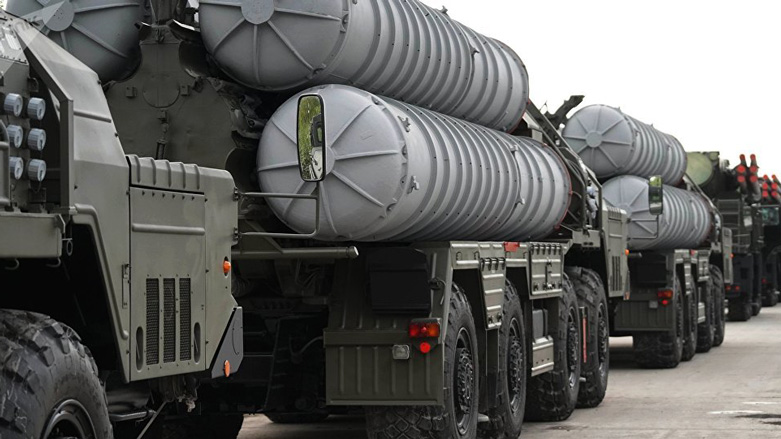US Position on S-400 has not changed, contrary to Turkish claims

WASHINGTON DC (Kurdistan 24) - On Friday, Turkey’s largely government-controlled press reported that US President Donald Trump had agreed to a proposal from Turkish President Recep Tayyip Erdogan to establish a working group to study the impact of Turkey’s planned acquisition of Russia’s advanced missile defense system, the S-400.
Such an understanding would, at least, postpone the looming crisis in US-Turkish relations, if Ankara proceeds with the weapons purchase. However, both the White House and Pentagon affirmed on Friday that if Turkey were to take possession of the S-400, it would pose “an unacceptable risk.”
The Turkish claim of an agreement with Washington on establishing an S-400 working group stems from a telephone conversation between Trump and Erdogan on Wednesday.
The Turkish read-out of that conversation stated that the two leaders had discussed Turkey’s “proposal to establish a joint working group on the S-400 defense system.”
The appearance of amity was further enhanced, when, later on Wednesday, Ankara released from prison a Turkish-American physicist, Serkan Golge, a NASA scientist. The Turkish charge—Golge was involved in the 2016 coup attempt—was widely criticized as bogus, including by the US State Department.
Both Trump and State Department Spokesperson Morgan Ortagus welcomed Golge’s release, and on Thursday, Turkey’s currency and its stock market both rose, Reuters reported, “on expectations that ties with Washington will improve after the two presidents discussed Ankara’s purchase of Russian S-400 missile defense systems.”
However, the White House read-out of Wednesday’s conversation said only that Trump and Erdogan had discussed “Turkey’s planned purchase of the S-400 missile defense system.” The US account of their conversation did not mention an S-400 working group.
Read More: US warns Turkey amid differences over S-400 'working group'
The White House and Pentagon response on Wednesday to questions about discrepancies in the US and Turkish accounts of the two presidents’ conversation was relatively mild.
However, on Friday, it stiffened significantly. “We have been clear that obtaining the S-400 would create an unacceptable risk to US technology, our pilots, and our aircraft,” National Security Council Spokesperson Garrett Marquis told Kurdistan 24.
“The United State has sent technical teams to Turkey more than once and hosted counterparts here to discuss the threat posed by the S-400,” he added. “We continue robust discussions with our Turkish counterparts at all levels.”
Pentagon Spokesman Eric Pahon provided more detail, as to why Turkey’s acquisition of the S-400 was such a big problem for the US.
“We have been clear that purchasing the S-400 would create an unacceptable risk, because its radar system could provide the Russian military sensitive information on the F-35. Those concerns cannot be mitigated,” he said.
“The S-400 is a system Russia built to try to shoot down aircraft like the F-35,” Pahon continued. “It is inconceivable to imagine Russia not taking advantage of the collection opportunity.”
Nonetheless, on Friday, Turkey’s Foreign Ministry spokesman, Hami Aksoy, denied that there had been any change in Turkey’s plans to acquire the Russian missile system.
“Reports in some media outlets about Turkey evaluating delaying the S-400 procurement upon the request of the United States do not reflect the truth,” he said. “The process of procuring S-400s from Russia is continuing as planned.”
Dr. Aykan Erdemir, a former Turkish parliamentarian and currently a Senior Fellow at the Foundation for Defense of Democracies, noting the apparent misrepresentation of the US position in the Turkish media, advised, “Lately, there has been a systematic attempt by the Turkish government to deliberately leak misinformation to downplay the divergence between the US and Turkish positions.”
“This is driven to a large extent by Erdogan’s desperate need to sustain Turkey’s flailing economy until the June 23 rerun of Istanbul’s mayoral election,” Erdemir told Kurdistan 24. “Every positive spin provides Turkish currency and stock market a lifeline for yet another day.”
These “stopgap measures,” however, can only “postpone the impending crashes—both in foreign relations and in the economy,” he said.
Paul Davis, a former Pentagon analyst and currently a Senior Fellow at Soran University, suggested to Kurdistan 24 that most US officials probably think that Erdogan will reverse course at the last minute, “because the consequences of proceeding with the S-400 purchase are so serious” for Turkey.
US officials have suggested that Moscow’s leverage over Ankara regarding the S-400 stems from the situation in Syria. A full-scale Syrian-Russian offensive in Idlib Province would deny Ankara its last foothold there and produce a humanitarian catastrophe, sending huge numbers of refugees northward toward Turkey.
However, Turkish analysts have offered an additional perspective: focused on Erdogan’s personal situation.
Erdemir earlier suggested to Kurdistan 24 that there might be some “interpersonal deal between Putin and Erdogan.”
Similarly, Metin Gurcan, a former Turkish Special Forces officer, writing in Al-Monitor, suggested that Russian advisers might now be helping Ankara bolster its internal security.
A recent column by Melik Kaylan in Forbes proposed that, in the wake of the failed 2016 coup, Erdogan feels he cannot trust his own military.
“Air force officers need to be highly literate,” Kaylan wrote. “They tend to belong to the educated, more secular classes” and “often spend years abroad learning their technical skills. In short, they're comprised of Erdogan's anti-demographic.”
If the issue really is Erdogan’s personal security, Washington may well find that all its threats, on the one hand, and all its enticements, on the other, will prove fruitless.
Is the US prepared for that? Davis thinks not. “Unfortunately, our bureaucracies can’t adjust rapidly to change,” he said. “They move glacially.”
